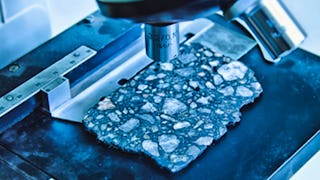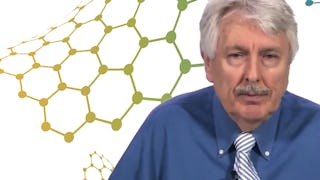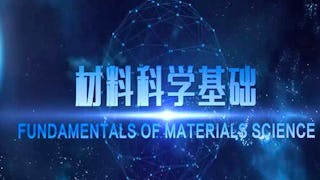In this course, we will present atomic bonding and its relation to crystal structure and physical properties. A particular focus will be on the different types of cubic structures. There will be an introduction to planes and Miller Indices. We will discuss the principal planes in the cubic system. Their common crystallographic defects will be shown and discussed. Finally, the tensile test will be used to extract various materials parameters.


Crystal Structures and Properties of Metals
This course is part of Materials Science for Technological Application Specialization

Instructor: Terry Alford
3,439 already enrolled
Included with
(36 reviews)
Recommended experience
What you'll learn
Crystal Structures, Mechanical Properties of Metals, Tensile Testing, and Failures.
Skills you'll gain
Details to know

Add to your LinkedIn profile
See how employees at top companies are mastering in-demand skills

Build your subject-matter expertise
- Learn new concepts from industry experts
- Gain a foundational understanding of a subject or tool
- Develop job-relevant skills with hands-on projects
- Earn a shareable career certificate

There are 5 modules in this course
In this course, we will present atomic bonding and its relation to crystal structure and physical properties. A particular focus will be on the different types of cubic structures. There will be an introduction to planes and Miller Indices. We will discuss the principal planes in the cubic system. Their common crystallographic defects will be shown and discussed. Finally, the tensile test will be used to extract various materials parameters.
What's included
1 video1 reading
The semiconductor industry requires scientists and engineers with a deep understanding of materials science and engineering. In this module, we will see a high-level overview of materials science and engineering, and learn about materials selection, materials families, types of bonding, and processing of materials.
What's included
5 videos8 readings1 assignment2 discussion prompts
In this module, we cover crystal structures, crystal imperfections and defects in crystals.
What's included
4 videos8 readings1 assignment2 discussion prompts
In this module, we will explore the mechanical properties of materials and discuss the tensile testing of materials.
What's included
6 videos8 readings1 assignment2 discussion prompts
In this module, you will explore mechanical properties and failure of materials.
What's included
8 videos6 readings1 assignment1 peer review1 discussion prompt
Earn a career certificate
Add this credential to your LinkedIn profile, resume, or CV. Share it on social media and in your performance review.
Instructor

Offered by
Explore more from Mechanical Engineering
 Status: Free Trial
Status: Free TrialArizona State University
 Status: Preview
Status: PreviewGeorgia Institute of Technology
 Status: Preview
Status: PreviewGeorgia Institute of Technology
 Status: Preview
Status: PreviewShanghai Jiao Tong University
Why people choose Coursera for their career





Open new doors with Coursera Plus
Unlimited access to 10,000+ world-class courses, hands-on projects, and job-ready certificate programs - all included in your subscription
Advance your career with an online degree
Earn a degree from world-class universities - 100% online
Join over 3,400 global companies that choose Coursera for Business
Upskill your employees to excel in the digital economy
Frequently asked questions
To access the course materials, assignments and to earn a Certificate, you will need to purchase the Certificate experience when you enroll in a course. You can try a Free Trial instead, or apply for Financial Aid. The course may offer 'Full Course, No Certificate' instead. This option lets you see all course materials, submit required assessments, and get a final grade. This also means that you will not be able to purchase a Certificate experience.
When you enroll in the course, you get access to all of the courses in the Specialization, and you earn a certificate when you complete the work. Your electronic Certificate will be added to your Accomplishments page - from there, you can print your Certificate or add it to your LinkedIn profile.
Yes. In select learning programs, you can apply for financial aid or a scholarship if you can’t afford the enrollment fee. If fin aid or scholarship is available for your learning program selection, you’ll find a link to apply on the description page.
More questions
Financial aid available,
¹ Some assignments in this course are AI-graded. For these assignments, your data will be used in accordance with Coursera's Privacy Notice.

